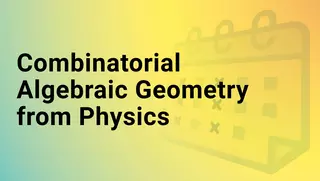
Combinatorial Algebraic Geometry from Physics
This one-week course offers an introduction to recent advances in combinatorics and algebraic geometry that were inspired by particle physics. How can quantum field theory help with enumerating graphs? How does scattering of elementary particles lead to the study of semialgebraic subsets of configuration spaces? We will learn about these questions and more in the following two lecture series.
Michael Borinsky: Counting graphs using quantum field theory
Quantum field theory is surprisingly effective at describing various interesting algebraic-geometric and topological invariants. In this lecture series, we will examine this fascinating connection between physics and mathematics by focusing on simple topologies: graphs. The quantum field theory framework allows us to solve numerous interesting graph counting problems, many inaccessible using traditional methods. I will introduce this elegant combinatorial framework focusing on asymptotic graph enumeration. We will discuss applications in topology and, if time permits, statistical mechanics and complex networks.
Thomas Lam: Moduli spaces in positive geometry
Recent developments in the physics of scattering amplitudes has led to the new field of positive geometry. We will discuss positive geometries appearing in projective space, Grassmannians, moduli spaces of rational curves, and various configuration spaces. The focus of the lecture series will be on the algebro-geometric aspects of positive geometries, together with hints of the relations to phi^3-amplitudes, super Yang-Mills amplitudes, and string theory amplitudes.
Limited travel funding can be provided for early-career participants such as postdoctoral researchers and PhD students. Applicants are expected to submit a brief academic CV and a motivation letter. The application for funding is included in the registration form.
Registration is closed.